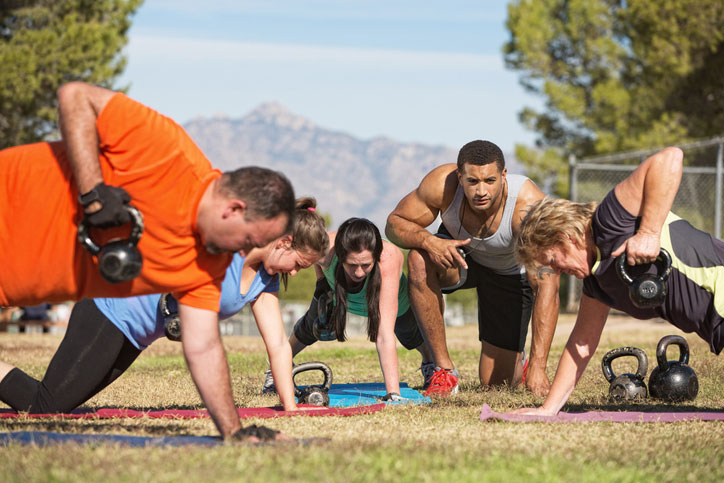
There are few things more glorious to a personal trainer than to look out over a field of clients of all shapes and ages, sweating in harmony as they push themselves toward better health in a specialized fitness program.
The camaraderie, intensity, and interpersonal support that come with these scenes are life goals for both trainers and trainees. And one of the best places to bring that environment to life is in a personal training boot camp.
Boot camp training is all about pushing participants to work harder than they ever would on their own. And if you ask the growing number of people around the country that are joining this fitness movement, they’ll tell you that it’s a mix of traditional calisthenics, body weight training, strength training, and interval training that’s as much about the mind as it is about the body.
Accountability, bonding, and encouragement all bring real value to clients enrolled in a boot camp fitness program.
As a personal trainer specializing in boot camp training, you will be more than an instructor. You’ll also be a guiding force and a motivator, encouraging your clients to dig deep to reach their goals. And since you will have a sense of what it takes for clients to push past barriers and keep their goals in focus, you will also serve as a catalyst for the self-motivation your clients will need to bring with them to the gym.
What is Boot Camp Training, Exactly?

Boot camp training is no one single thing—and that’s part of the value. All boot camps bring in elements of the trainer’s philosophy and design.
The common traits that all boot camps share come through their group activity and intensity. Like the military training regimes that give boot camps their name, personal fitness boot camps use the shared experience under pressure to create results far beyond what individuals would achieve in a one-on-one exercise setting.
Boot camp training is generally an outdoor group exercise that combines functional movements with cardiovascular and strength exercises in a fast-paced setting.
And because you, as a trainer, can engage with multiple clients simultaneously, boot camps can be more fun and more lucrative for you, while at the same time costing clients less than they might spend for more personalized attention.
Boot camp training programs typically last about four weeks and can go by several different names. You might hear them referred to as:
- Adventure boot camps
- Extreme fitness camps
- Exercise camps
- Lifestyle camps
- Fitness camps
Regardless of the type of boot camp training you oversee, you will likely:
- Complete cardiovascular exercises, such as running, hiking, or obstacle courses
- Complete strength training using body resistance or equipment, such as exercise bands, dumbbells, or body weights
- Incorporate stretching and mobility exercises, including warm-ups and cool-downs
Boot Camps Can Tailor Fitness Regimes To Different Goals or Groups
Many boot camp training programs are aimed at specific populations and therefore may be named according to the clients they serve:
General fitness boot camps – Some clients just need to get out of their chairs or off their couches and get into better shape generally. Personal trainers have exactly the recipe for these folks—a well-rounded exercise program of elevating intensity that develops heart-health, strength, endurance, and overall well-being. General fitness bootcamps can embrace clients of any age or fitness level and put them together with others who have the same goals and needs.
Sports-specific boot camps – As a personal trainer, you’re going to be well-equipped to design very specific types of strength and endurance training that is appropriate to different kinds of sport or exercise activities. These sports-specific bootcamps offer individuals in certain types of sports a more focused work-out that is better for their specific needs, including:
- Running boot camps – Runners need great cardio and a real lower-body focus while keeping the weight down and mastering running technique. Running boot camps offer a more technical approach to personal training while keeping fitness levels off-the-charts.
- Cycling boot camps – Cycling boot camps have gotten a boost lately from the success and popularity of Peloton, but personal trainers have understood for a long time that combining spin exercise with weightlifting and mobility is a winner for both people training for cycling and those in need of low-impact, high-intensity exercise.

- Skiing boot camps – The slopes are only open in the winter, but hardcore skiers can prepare for their favorite time of year at special ski conditioning boot camps any time. Strengthening joints, improving the core, and enhancing mobility are all outcomes that will make skiers safer and better prepared when the flakes start to fall.
Women only fitness boot camps – Many personal trainers who specialize in women’s fitness recognize the appeal of women-only bootcamps. Offering strength and conditioning training in a nonjudgmental, supportive female-only environment can lead to faster gains and happier clients.
Weight loss boot camps – Every personal trainer has them: clients who walk in the door desperate to shed that extra 20, 40, 80 or more pounds they have packed on and suddenly woken up and decided to do something about. And every personal trainer has a recipe for burning them off. All the strength, cardio, and motivational elements of those programs come together in weight-loss bootcamps where the clients help one another as you help them become the thinner, fitter person they’ve always wanted to be.
Boot camps for brides – A specialized subset of those weight-loss clients are brides to be who are desperate to look their best on their wedding day. Helping these ladies tone up and slim down to show off their wedding dress through a focused boot camp environment is the goal for personal trainers running these camps.
Boot camps for seniors – America is a graying nation. According to the Census Bureau, the number of American over the age of 55 will roughly double by 2030. At the same time, their life expectancy is increasing—those reaching 65 have a 25 percent chance of also making it to 90. Yet their bodies continue to experience wear and their fitness levels are an important part of their quality of life. Boot camps focused on senior fitness are already an important way for trainers to reach and serve that population with the kinds of exercises and fitness focus they need. In the future, they’ll become even more important and widespread.
Kids’ boot camps – Setting fitness standards for a lifetime of good health and well-being happens in childhood and adolescence. But working with kids can be a far cry from the usual personal fitness gig. Boot camps are fun, exciting ways to get kids hooked on exercise and fitness.
Of course, there are no real limits to the different sorts of specialized boot camps you can offer. Your imagination and the potential base of customers can be your guide in putting together camps with special appeal.
How To Do Boot Camps Your Way as a Personal Trainer
One of the great things about running a boot camp yourself as a personal trainer is that you can do it any way you want to. It’s as much a marketing opportunity as it is a way to deliver great fitness training to your clients. And it’s a way to express your own ideas and concepts in fitness for a broader audience.
It can take a little work to right-size your routines for a larger group.
As a personal trainer, your boot camp training program will likely include many forms of plyometric and interval training, with only short rest intervals between exercises. Typical exercises in a boot camp training program include:
- Speed training (sprinting)
- Squats
- Lunges
- Jumping jacks
- Squat thrusts
- Planks
You may want to keep it simple to make it easier to observe and correct a group of clients versus just one person. But experience can be your guide—your first boot camp won’t be your last one, and you can tailor the activities toward what works as you learn.
 Your boot camp training program may consist of just one client, or a small group of between six and ten people. You will also likely incorporate team, partner, or group competitions/exercises in boot camp training programs that involve two or more clients.
Your boot camp training program may consist of just one client, or a small group of between six and ten people. You will also likely incorporate team, partner, or group competitions/exercises in boot camp training programs that involve two or more clients.
Any good boot camp training program will involve assessing the fitness level of clients before the program begins and again at the end of the program as a way to show clients the results of the efforts they put in.
Your Role as a Boot Camp Personal Trainer
The major underlying component of any boot camp training program is the spirit of teamwork and camaraderie that you create. The training program you design and implement as a personal trainer will vary according to:
- The focus of your program
- The end goals of the program
- The space and equipment constraints
- The age and current capability of the people participating.
Even as you tailor the program to fit the setting and the goals of your clients, one thing will always remain the same – your job will be to encourage, motivate, and inspire the people you train.
In addition to providing your clients with a whole-body fitness program, you will be challenging them to work hard, all the while building their self-esteem and confidence. In fact, the success of a boot camp training program almost always comes down to the positivity of the instructor.  Although the “boot camp” name would suggest a drill instructor-style approach, you will find that positive encouragement is still the most effective way to keep clients motivated and pushing hard to reach their personal fitness goals.
Although the “boot camp” name would suggest a drill instructor-style approach, you will find that positive encouragement is still the most effective way to keep clients motivated and pushing hard to reach their personal fitness goals.
Like traditional military boot camps, you will offer an intense mix of strength and cardio training. Your boot camp training program may be focused on traditional calisthenics, or you may choose to focus on military-style drills in the spirit of an actual military boot camp.
How To Find the Right Clients for a Boot Camp Fitness Training Program
In general, your goal as a boot camp personal trainer is to provide your clients with an intense, boot camp-inspired workout by taking them through ballistic, rapid-style movements. In the end, your clients will build strength, endurance, and agility as a result of the training experience you create for them.
You may offer your boot camp training program through business or community centers like:
- Fitness centers
- Gyms
- Community or senior centers
- Company-sponsored programs
- Schools or colleges
Or you may simply choose to advertise your services on social media or in your local paper. You can put a group together yourself operating independently, or look for ready-made groups like those that come with corporate health programs. It’s entirely up to you how to market and deliver boot camp fitness training.
Many personal trainers advertise their services widely and then travel to different locations to offer boot camp programs.
Benefits of a Boot Camp Training Program

You would never have gone into personal training if you weren’t already sold on all the benefits it brings. You’ve seen people come in out-of-shape and depressed, and walk away again with their chin up and feeling like a million bucks. The right fitness program in any context can offer benefits like:
- Promoting cardiovascular health
- Building strength and endurance
- Improving agility and mobility
- Burn as many as 500 – 600 calories per one-hour session
- Provide a total-body workout
And they can do it without special equipment, through varied and challenging workouts that are just as fun as they are intense.
How a 2010s TV Series Highlighted the Growing Popularity of Bootcamp Style Fitness
 Boot camps for fitness have been around in the United States since at least the 1980s, but the trend maybe got its greatest boost starting in 2005. That’s the year the first season of Celebrity Fit Club: Bootcamp aired.
Boot camps for fitness have been around in the United States since at least the 1980s, but the trend maybe got its greatest boost starting in 2005. That’s the year the first season of Celebrity Fit Club: Bootcamp aired.
Running from 2005 to 2010, the series featured two teams of celebrities trained and mentored by a former U.S. Marine Corps drill instructors and a panel of health and psychology fitness experts. The two teams competed in exercises and challenges designed to get them down to their target weights, with the most successful team winning.
Although the series got off to a somewhat slow start, eventually it drew celebrities such as Danial Baldwin, Gary Busey, Kelly Le Brock, and Bobby Brown. And it showed the American public what the possibilities of a high-intensity, properly led fitness boot camp could be.
Offering a boot camp brings new advantages, though. In some cases, clients can find benefits from a personal training boot camp program that they might not even realize in a more personalized training approach. Personal fitness boot camps can:
- Serve as a great team-building program
- Provide participants with a sense of satisfaction and accomplishment
- Challenge clients to push themselves and achieve more
- Offer positive reinforcement and encouragement from the group
And this can all happen at a more affordable rate in many cases, since you, the trainer, can spread the costs of your time among all the people in the camp.
How to Become a Personal Trainer with a Specialization in Boot Camp Training

At this point, it would be a surprise if you aren’t totally sold on the boot camp approach to personal fitness training. But how do you get started as a specialized boot camp personal trainer?
The path to becoming a personal trainer specialized in the boot camp training model doesn’t follow one prescriptive path, but always involves getting the right education and credentials.
A rewarding career in personal training can be built on a comprehensive education. This is accomplished through an associate or bachelor’s degree relevant to personal training, in areas like:
- Exercise physiology
- Kinesiology
- Exercise science
In addition to providing students with a liberal arts foundation and a core set of science courses, formal degree programs offer students a chance to explore advanced topics related directly to personal training, such as:
- Nutrition and health – Just like the military versions, boot camps in personal fitness are intended to be the beginning of the journey, not the end. So, drilling participants in life-changing choices in nutrition and health must come from your own education in the subjects.
- First Aid and CPR – Although it’s not something any personal trainer ever hopes to encounter, the odds of a client suffering an injury during training go up with more participants. You’ll want to be prepared with the essentials of first aid and CPR just in case.
- Chronic disease and obesity – According to the National Health and Nutrition Examination Survey, more than 40 percent of American adults are overweight. Assessing your boot camp participants before you get started requires some knowledge of what to look for in health and fitness levels. Understanding the roots of American obesity and the chronic conditions it may lead to will allow you to tailor your programs to the right levels.
- Biomechanics – Of course, proper body positioning and an understanding of biomechanics is key for all personal trainers. Having a deeper education and more experience in the field will allow you to quickly view and correct issues in a large boot camp group, however.
- Principles of strength and conditioning – The fundamentals don’t become any less important in big boot camp groups. With a college education in the essential principles of strength and conditioning work, you’ll be able to offer participants exactly what they are paying for.
Of course, most of these degree programs also come with a wide range of electives that can offer further preparation in different boot camp specialty areas. You’ll have a chance to work with professors and participate in internships with different fitness organizations that will build out your knowledge. And you’ll get the kind of generalist knowledge in psychology, society, and culture that will be important in tuning small group dynamics for an effective and supportive boot camp experience.
Going Further in Your Education With Master’s Studies Can Hone Your Boot Camp Training Expertise
 Of course, there’s no need to stop at the bachelor’s level if you are really into mastering your craft as a trainer. Graduate-level studies in all the same major areas can give you an expertise that will put you among the elite in the personal training field.
Of course, there’s no need to stop at the bachelor’s level if you are really into mastering your craft as a trainer. Graduate-level studies in all the same major areas can give you an expertise that will put you among the elite in the personal training field.
Taking an additional year or two, master’s programs set aside the more general studies offered in associate and bachelor’s programs for a more focused, in-depth exploration of the scientific principles of human fitness and exercise.
You’ll find more opportunities for practical applications in the field, too, with internship opportunities available at high levels in various fitness and sporting organizations. And with smaller class sizes, professors can give you more direct interaction and mentorship to answer all your questions and help you develop your own approaches to boot camp fitness training.
Put that education together with professional certification from a nationally recognized certifying body, and you have all the tools you need to offer effective and fun boot camp experiences to your clients.
Certification Offers Clients the Assurance of Quality and Safety in Your Boot Camp
If you’ve been looking into personal training already, you probably understand how important certification can be in attracting clients. Anyone can print up a business card and put up a website. But earning a professional certification in the field shows that you’re serious, and that a big national organization has determined that you know what you’re doing.
Professional certification in personal training is offered by several certifying agencies, the best of which are accredited by one of three national accreditation agencies:
- NCCA – National Commission for Certifying Agencies
- DEAC – Distance Education Accrediting Commission
- NBFE – National Board of Fitness Examiners
A few of the most popular and most respected organizations that offer accredited professional certification in personal training include:
- American Fitness Professionals & Associates (AFPA)
- American College of Sports Medicine (ACSM)
- American Council on Exercise (ACE)
- National Academy of Sports Medicine (NASM)
- National Council for Certified Personal Trainers (NCCPT)
- National Federation of Professional Trainers (NFPT)
- National Strength and Conditioning Association (NSCA)
- National Exercise and Sports Trainers Association (NESTA)
- American Sports & Fitness Association (ASFA)
To earn any of these certifications, you typically have to meet stringent standards that are measured in three ways:
- Experience – Most certifications, and definitely all the advanced ones, will require that you have at least some practical experiences as a trainer. This may be vouched for by an employer or through other documentation.
- Education – You’ll also have to meet certain educational minimums… at least a high school diploma and CPR certification, but for more stringent certs, some level of college study may be required. In other cases, the certification organization itself will have mandatory classes you have to take and pass.
- Examination – Finally, you will need to take and pass a formal examination on the subject matter to prove you know your stuff.
It can take time and money to get a certification as a personal trainer, but it’s proof to potential clients that you have put in the time and know what you are doing.
A general personal fitness trainer certification is good, but a specialty certification in boot camp training can be even better. Several organizations also offer specialty certification in boot camp training, including:
- National Academy of Sports Medicine, Group Personal Training Specialist
- National Exercise and Sports Trainers Association, Adventure Bootcamp
- The Cooper Institute, Boot Camp and Circuits Leadership Certification Program
- FiTOUR, Boot Camp Fitness Certification
- American Sports & Fitness Association, Group Fitness & Bootcamp Instructor Certification
Any of these certifications signal that you are taking your responsibilities as a boot camp fitness trainer seriously. And each of them forces you to study the subject of personal fitness in the boot camp context, making you a more capable and more effective drill instructor. If you get a charge out of getting groups of people into better shape through fast-paced, high-intensity, fun workouts, then specializing as a boot camp fitness trainer may be exactly what you were made for.